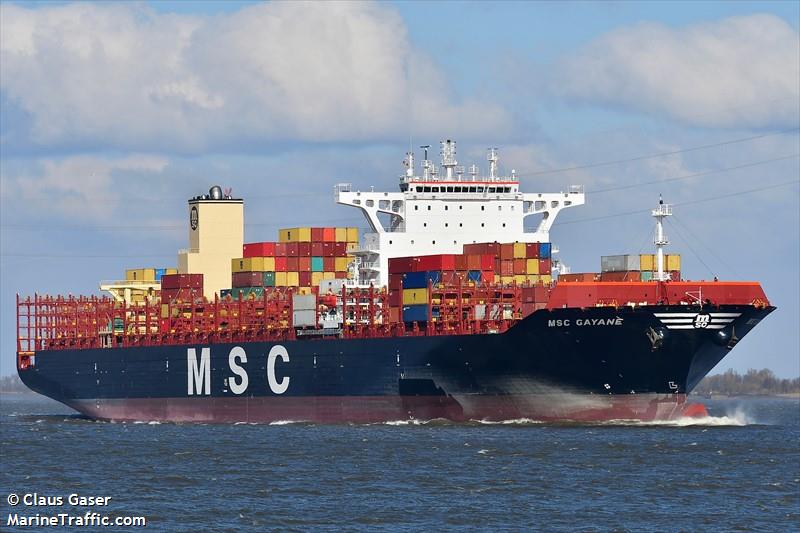A JPMorgan Asset Management-owned ship has just been impounded by the US authorities because it was carrying in its cargo $1.3 billion worth of cocaine.
Naturally, there have been no calls for the banning of cash, or investment banks for that matter, by the “ban bitcoin” crowd.
The ship is operated by the Switzerland-based Mediterranean Shipping Company (MSC). The MSC Gayane was seized in Philadelphia after 39,525 pounds (nearly 20 tonnes) of the drug was found onboard.
The containership was built in 2018 and is Liberian flagged.
It is apparently the largest marine interception every conducted by US Customs and Border Protection. Six crew members have been arrested.
This isn’t the first time a bank has been caught up in the drugs trade, albeit indirectly in JP Morgan’s case.
Drug money laundering and logistics: banks and shipping companies are serial offenders
Readers will remember when global bank HSBC was directly involved in laundering the money of Latin American drugs cartels.
The bank admitted as much and paid out $1.9 billion to settle with the US authorities, narrowly avoiding – as banks often do – being criminally prosecuted for its anti-money laundering violations.
In that case US prosecutors were forced into action after a US Senate hearing and the subsequent 300-page report found that HSBC’s Mexico operation had been facilitating the laundering of cartel money by “drug kingpins and rogue nations”.
You won’t be surprised to hear that the same authorities have not called for the shutting down of HSBC or the removal of cash from the financial system.
So, we’ve been here before with the banks. But so have we with MSC.
In June the very same containership, sailing from Colombia, was found upon arrival at Philadelphia to have $1 billion of cocaine onboard (16.5 tonnes). Arrests were made but the MSC Gayane was allowed to set sail on the same voyage yet again. The ship operator has as yet faced no legal penalty.
This blatant serial offending is probably why the US authorities are saying that this time they may not be releasing the vessel in what would be an unprecedented but justified move.
Ban bitcoin but laundering drug lords’ cash proceeds is fine!
I was talking to an editor of a City of London trade publication the other day at a party and in bombastic fashion he dismissed crypto out of hand, saying it should be banned.
His reasoning for a prohibition on crypto was that the only thing it was really used for was buying drugs.
I gave him about 10 other current use cases, none of which involved illegal or illicit activities, but he wouldn’t have it. “Ban the crap,” he insisted.
It is of course true that crypto is used in the drug trade but then again so is cash. In fact, cash has much the larger footprint of the two by some distance.
Indeed, they are close cousins. Here’s an example.
Bitcoin ATMs and drug gangs
The Metropolitan police in London complained that London drug gangs were laundering their cash through bitcoin ATMs.
Just down the road from where I live, a local butcher who does a line in bitcoin ATM’s is, I think, on his fourth machine. I live in an inner-city area that is being gentrified – we have a craft beer bar that has just opened up, so you get the drift.
There is clearly demand, even in the depths of the crypto winter, for the ATMs, although the number of firms in the industry seems to be in a state of flux in north London.
The point here is that the street soldiers of the big business organised crime organisations in the first instance rely on cash to conduct their business.
But the same anti-crypto crowd that want prohibition have nothing to say about cash apart from maybe get rid of the biggest bank notes. Hypocrisy, by its very nature, has no shame.
Pomp weighs in
Anthony Pompliano of Morgan Creek Digital hits the nail on the head in a recent tweet.
Craig Wright says one of the reasons he stopped working on bitcoin was because of the illegal activities it was helping to fuel, including drug trafficking. He says it is why he (or his team at nChain) created the Bitcoin Satoshi Vision fork.
No one is saying that crypto is not involved in drug trafficking and other illicit activities and it is certainly a worry for the authorities, especially on the dark web.
However, trying to ban censorship resistant crypto is a fool’s errand as would trying to ban its peer to peer analogue cousin cash.

